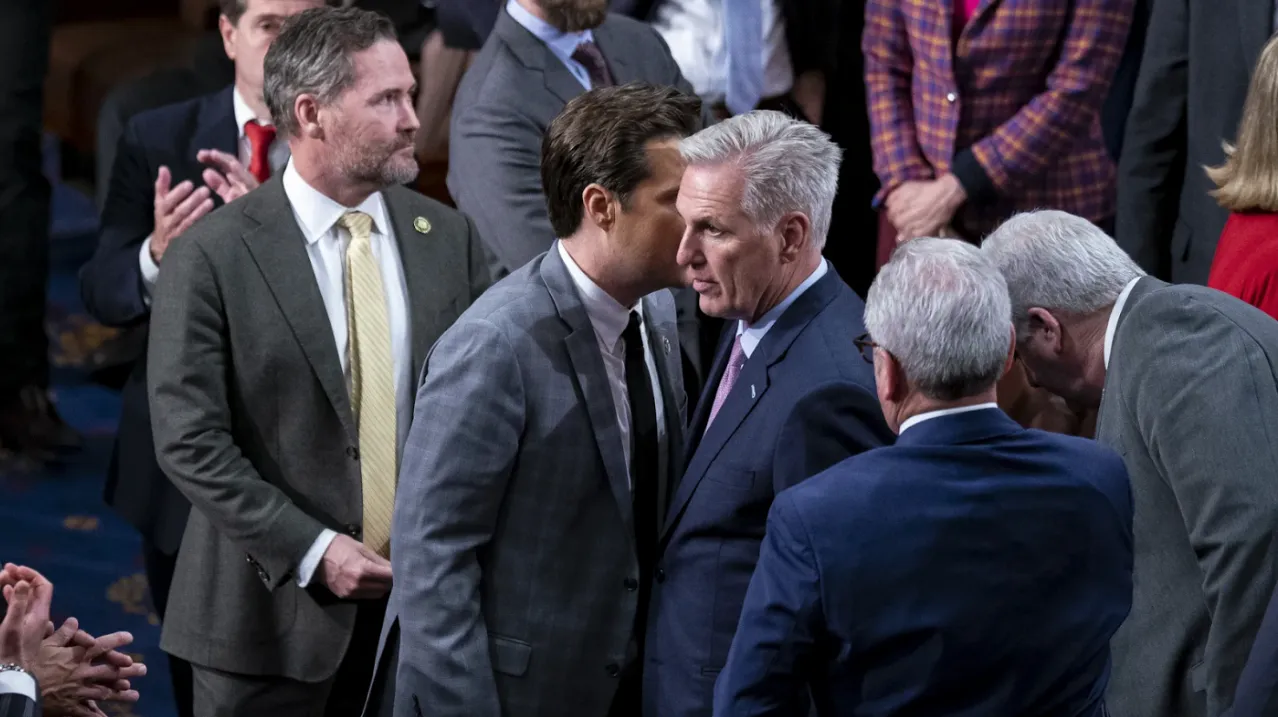Table of Contents
As chaotically as it began, the rudderless speakership of Kevin McCarthy ended two weeks ago after a group of Republican detractors successfully pushed for his removal. The tail end of his tenure will be remembered not for any legislative achievements, but for a severe bout of dysfunction.
According to most pundits, the downfall of McCarthy is indicative solely of pervasive strife among Republicans. Commentators note the instability of McCarthy’s hold on power from the start, as he required a historic fifteen ballots to become speaker. They correctly identify Matt Gaetz, our most ludicrous congressman, as the man who helms the unofficial Burn it All Down Caucus. Yet these nuggets of truth failed to elucidate the full story.
To secure his ascension, Speaker McCarthy promised to restore “regular order” to appropriations. For non-politicos, regular order is how Congress has historically passed budgets: by moving twelve individual spending bills through their relevant committees, then separately debating and voting on each of them. The most recent year that this procedure took place was 1996.
The return of regular order should be a priority for any conservative appalled by trillion-dollar omnibus packages dumped on members days before Christmas. It was shocking, therefore, when a handful of allegedly conservative House Republicans derailed the proceedings by refusing to allow debate—not pass, but allow debate—on the first appropriations bill for defense.
Those members’ concern was not the military spending in question, but the anticipated spending levels of the numerous other bills yet to arrive on the floor. By disallowing debate to occur on the first spending plan, however, the remaining budget proposals could not be amended. Regular order never came to fruition, as only four out of twelve appropriations bills emerged from the chamber a mere two days before the expected shutdown.
McCarthy soon realized that his chamber’s budget would be laughably incomplete before the fiscal year’s end. He subsequently sought to pass a continuing resolution, or a bill that would extend current appropriations for thirty days, with less than forty-eight hours remaining.
To win over his conference’s most intransigent faction, the proposed resolution would have slashed nearly every agency’s budget by a third and contained a comprehensive border security plan drafted by Texas Republicans. For twenty-one GOP hardliners, neither concession was enough to garner their support. The continuing resolution failed, 198-232.
Finally backed into a corner, McCarthy did what he hoped never to do: rely on Democratic votes to fund the government. Under his direction, the House passed a “clean” continuing resolution hours before funding ran dry. No spending cuts or border provisions were attached, and thus, many more Democrats than Republicans supported the bill’s passage. A looming shutdown had been averted, but Speaker McCarthy had also provided his right-wing detractors a reason to demand his ouster.
And oust him they did! Through a motion to vacate the speaker’s chair, Representative Matt Gaetz and seven other Republicans cast their votes to terminate McCarthy’s eight-month-old incumbency.
You read that right; a total of eight Republicans voted against Kevin McCarthy. Eight, mind you, is fewer than the number of senators who voted against funding the U.S. military last year. Eight is fewer than the number of representatives who opposed making Juneteenth a national holiday. How on earth could eight dissenting congressmen overthrow a sitting speaker?
The answer: Eight representatives did not vote to remove Speaker McCarthy; two hundred and sixteen did. To punish the speaker for depending upon Democratic votes, Matt Gaetz launched an effort to eject McCarthy that—of course—wholly depended on Democratic votes.
Several centrist Democrats attempted to work with Republicans to keep McCarthy in power. But that effort was quickly scuttled by Minority Leader Hakeem Jeffries, who gave his conference marching orders to support Gaetz’s motion. Every single House Democrat would go on to follow their leader’s instructions. So, while the man who first called for McCarthy’s removal may have been a Republican, the decisive vote itself was a thoroughly Democratic endeavor with a select few GOP defectors.
What was the Democrats’ reasoning? The frontrunners to replace Kevin McCarthy are considerably more conservative than he is, so their votes were not to produce a more liberal speaker. And McCarthy did not permit a shutdown as many warned, but instead capitulated to the opposing party so that the government could remain open.
The only cogent rationale for the Democratic elevation of Gaetz’s insurgency was the political windfall their party could reap from a Republican meltdown. As an internally-circulated GOP letter observes, Democrats “voted for the chaos” they knew would ensue “and now hope to benefit politically from it,” rather than acting on principle. Consequently, the latest bipartisan ignominy to emanate from the People’s House should motivate voters in both parties to seek new representation next year.








